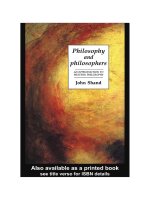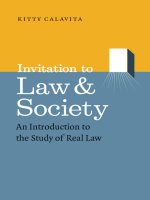mcgill-queens university press philosophy and philosophers an introduction to western philosophy dec 1993
Bạn đang xem bản rút gọn của tài liệu. Xem và tải ngay bản đầy đủ của tài liệu tại đây (21.19 MB, 363 trang )
Philosophy
and
philosophersPhilosophy
and
philosophers
An
introduction
to
Western
philosophy
John
Shand
A
veL
I i
I I
PRESS
©
John
Shand
1993
This
book
is
copyright
under
the Berne
Convention
.
No
reproduction
without
permi
ssion
.
All
rights
re
served
.
First
publi
shed
in 1993 by UCL Press
UCL Press
Limited
University College
London
Gower
Street
London
WC1E 6BT
This
edition
published
in
the
Taylor & Francis e-Library, 2003.
The
name
of
University
College
London
(UCL) is a regi
stered
trade
mark
u
sed
by
UCL Press
with
the
con
sent
of
the
owner
.
ISBN 0-203-49899-2 Ma
ster
e-book ISBN
ISBN 0-203-80723-5 (Adobe
eReader
Format)
ISBN:
1-85728-074-1 HB
Publi
shed
by
arrangement
with
Penguin
Books Limited.
The
moral
rights of
the
author
have
been
as
serted
.
A CIP catalo
gue
record for
thi
s
book
is available from
the
Briti
sh
Library
.
CONTENTS
Preface
vn
Introduction
Vln
Chronology
of philo
sopher
s Xl
1.
Presocratic
Greek
philosophy 1
Pre-
Parmenidean
philo
sopher
s
6
Parmenidean
philo
sopher
s 10
Post-
Parmenide
an
philo
sopher
s 15
2.
Greek
philosophy 21
Plato 23
Aristotle
35
3. Medieval philosophy 52
Augu
stine
55
Aquina
s
59
Ockham
65
4. Rationalism 74
Descartes 75
Spinoza 87
Leibniz 100
5. Empiricism 114
Locke 116
Berkeley 129
Hume
141
6. Transcendental idealism 157
Kant
160
7. Later
German
philosophy 176
Hegel
179
Niet
zsche 190
v
VI
Con~n~
8. Analytical philosophy 203
Russell 207
Wittgenstein 219
9. Phenomenology and existentialism
Husserl
Sartre
10.
Logical
positivism andfalsificationism
Ayer
Popper
11.
Linguistic philosophy
Wittgenstein
12.
Recent philosophy
Gilbert Ryle
Nelson
Goodman
W.v.O .Quine
J.L.Austin
Stuart
Hampshire
Donald
Davidson
P.F.Strawson
Thomas
S
.Kuhn
Paul
Feyerabend
Michael
Dummett
Richard Rorty
John
R.Searle
Saul Kripke
Bibliography
Index
232
232
245
259
260
271
284
284
305
305
306
306
307
307
307
307
308
309
309
309
310
310
313
333
PREFACE
Several
people
have
helped
me
write
this book.
I
should
especially like to
thank
my
wife
Judith
for
her
unflagging
and
invaluable
encouragement,
as
well
as
her
practical
help;
she
checked
the
whole
manuscript
and
proofs
and
also
pointed
out
anything
ambiguous
or unclear;
without
her
help
this
book
would
not
have
been
completed
.
I
should
like to
acknowledge
the
help
of
the
following people,
each
of
whom
read
and
commented
on
some
part
of the
manuscript:
David
Bell, Michael Clark,
David
E.Cooper,
Oswald
Hanfling,
Desmond
P.
Henry,
David
Lamb,
Harry
Lesser,
Kathryn
Plant, Robert Wilkinson.
Thanks
must
also go to Ted
Honderich
and
Jonathan
Riley. In a
general
way
I
should
like to
thank
all
my
past
Open
University
students,
whose
actual
and
hypothetical
opinions
as to
what
is
comprehensible
I
constantly
bore
in
mind
while
writing
the
book.
Invaluable
has
been
the
availability of
the
facilities of
the
University
of
Manchester
:
the
Philosophy
Department
library
and
especially
the
John
Rylands
University Library of
Manchester
.
Any
remaining
deficiencies in this
book
are
of
course
entirely
my
responsibility.
I
have
not
given
precise
references
for
quotations
in
the
book,
thinking
them
unnecessary
and
inappropriate
in a
work
of this
kind
.
However,
I
direct
the
reader's
attention
to
the
extensive
annotated
bibliography
. The
very
few
short
direct
quotations
used
are
therefore
left
without
precise
references,
although
I
sometimes
cite
the
work
from
which
the
quote
comes,
and
in all cases it
should
be
obvious
which
philosopher
is
being
quoted
.
JOHN
SHAND
Vll
INTRODUCTION
The
aim
of this
book
is to give an
introduction
to Western
philosophy
through
its past,
both
distant
and
more
recent,
and
to
serve
as a useful
work
for
more
advanced
students
of
philosophy
.
The
subject
of
philosophy
is
presented
in this
book
by
studying
the
thought
of major
philosophers
and
by concentrating
on
what
are generally
regarded
as
the
central
areas of
philosophy
:
the
nature
of
philosophy
itself,
the
theory
of
knowledge
(epistemology)
and
the essential
nature
of reality
(metaphysics).
It
is
hoped
that
this
work
will satisfy the curiosity of
those
who
want
to
understand
what
philosophy
is
and
will
provide
a
key to
further
study
of
philosophy
and
philosophers
. To
aid
the
reader
in
further
study
an
extensive
annotated
bibliography
is
included,
which
serves
as a
guide
primarily
to
works
by
and
about
the
philosophers
considered
in
this
book,
although
it
also
includes
reference to
more
general
works
in philosophy.
The
various
chapters
and
sections
within
the
book
can
be usefully
read in isolation, since
they
are relatively
autonomous,
although
there
is an
additional
cumulative
beneficial effect
that
results from
reading
right
through
the
book
in
order
.
It
is impossible to deal
with
every
controversy
over
interpretation.
However, every
attempt
has
been
made
to be clear
and
accurate. The
general approach to each philosopher considered is to present an account
which tries to make their views
hang
together convincingly, rather
than
subject
them
to
intense
critical dissection. There are, however,
some
critical observations which naturally arise from exposition.
It
is
difficult
to
give
an
account
of
the
defining
features
of
philosophy
. The reason for the difficulty in
answering
the
question
of
what
philosophy
is
paradoxically
provides
an
answer
of
sorts
. An
essential
part
of
philosophy
is
the
extent to
which
it reassesses its
own
nature
.
Philosophy
tends
to
ask
extremely
broad
and
fundamental
questions,
and
it raises problems
which
are
not
normally
considered
problems at all in
most
other
areas of
human
inquiry
. A feature
which
helps
us to
understand
the
nature
of philosophy,
and
is
one
of
the
chief
attractions of the subject, is its freedom of thought: in
philosophy
no
question
is, on
the
face of it,
unaskable
.
Philosophy
does
not
have
to be especially defensive or coy
about
its
VIll
Introduction
IX
nature
or
exi
stence
. It is sometimes said
that
the
subject
matter
of
philosophy
is far
removed
from
anything
that
could
have
practical
importance
in life .
Even
if
thi
s
were
true
it
would
not
follow
that
philo
sophy
is
not
worth
bothering
with
,
for
it
might
well
be
intrinsically interesting. In
any
case,
philosophy
doe
s
examine
idea
s in
ethics
and
politics
that
have
immediate
practical
con
sequences
.
Moreover,
one
of
the
rea
son
s
why
philosophy
is
important
is
that
more
than
any
other
subject
it
freely
examines
pre
suppositions
and
as
sumptions
that
people
have
that
might
otherwi
se go
unque
stioned
;
and
many
of
the
se
very
ba
sic
belief
s,
which
people
may
take
for
granted
,
lead
to,
and
underpin
,
other
beliefs
which
have
immediate
practical consequences in
that
they
determine
what
people
believe
and
how
they
act .
Whenever
and
wherever
we
live
we
ab
sorb
a
world-
view
which
can
be so familiar
that
it
can
,
through
going
unnoticed,
go
unexamined
. So
long
as
people
are
not
dogmatically
locked
into
, or
wedded
to, a fixed system of
idea
s
and
beliefs there will
alway
s be
philo
sophy
. Philo
sophy
is
not
a luxury,
indeed
it becomes a necessity
just
as
soon
as
people
are
able
and
willing to
think
freely
about
their
belief
s.
The
terrible
con
sequence
s
that
have
followed
from
dogmatically
held
beliefs
throughout
human
history
bear
sufficient
te
stimony
to
the
need
to
philosophize
.
Anyone
who
open-mindedly
and
critically examines,
rather
than
simply
accepts,
fundamental
ideas,
has started
doing
philo
sophy
.
Philosophy
cut
s
very
deeply
into
our
beliefs
concerning
the
world
and
our
place in it.
It is
characteri
stic of
philosophy
that
it
goe
s
back
to
where
most
other
subjects
begin
and
then
probes
still
further
back in its
inquirie
s.
Philo
sophy
di
scu
sses
enduring
problem
s
ari
sing
from life
and
thought.
It is
one
of
the
attraction
s of
philosophy
that
it connects
thinkers
of
otherwi
se
different
hi
storical
age
s
and
find
s
in
them
the
sam e
fundamental
problems
.
Reference
to
the
hi
storical
and
intellectual
context
in
which
a
philosophical position arose
may
help
us to
under
stand
what
is
meant
by
that
po
sition
.
However
, it is
important
not
to
confu
se
the
truth
of
philosophical positions
and
the
soundne
ss of
the
argument
s
presented
for
them
with
either
their
cau
sal, psychological, historical
origin
or
the
extent
of
their
cau
sal, psychological, historical influence.
Philosophy
involve
s
expounding
exi
sting
idea
s,
creating
new
imaginative
idea
s,
and
critically
asse
ssing
the
soundness of
argument
s
put
forward
in
support of
view
s
claimed
to be
true
.
Neither
the
cau
sal
origin
of a
claim
or
argument
,
nor
its
cau
sal influence
on
human
affairs,
has
any
relevance
in asses
sing
the
truth
of a
claim
or
the
soundness of
the
argument
pre
sented
for
it.
One
can
of
cour
se
trace
origins
and
influences as well,
but
that
is
not
the
same as,
and
not
a substitute for,
asses
sing
the
validity
of
arguments
and
the
truth
of beliefs. A
given
philo
sophy
could
have
an
intere
sting
origin
or
be
very
influential,
but
may
still be
bad
philosophy
for all that.
x Introduction
The
nature
of metaphysics
can
be characterized as
the
attempt
by
reason
and
argument
alone to
understand
the essential
structure
of
the
world
on
the
presupposition
that
there
must
be
some
features
that
all
possible realities
must
have
in
common,
however
else
they
may
differ.
The
metaphysician
claims
to be
able
to
determine
some
general
necessary
truths
about
the
nature
of
reality
by
reason
alone
independently
of
observation
and
the
evidence
of
experience
.
Epistemology is concerned
with
what
knowledge
is,
what
conditions
have
to be satisfied for knowledge,
what
counts
as
good
evidence
and
justification,
and
what
in
that
case
are
the
kinds
of
things
we
can
know.
Both
metaphysics
and
epistemology
raise
questions
which
cannot
be
answered
by empirical scientific investigation because
any
such
investigation
will
have
metaphysical
and
epistemological
assumptions
and
presuppositions
underpinning
it,
and
so
any
answers
derived
from science
would
beg
the
questions
raised. For
example
science
makes
assumptions
about
the
reliability of empirical evidence,
the
nature
of
empirical
theories,
and
what
conditions
have
to be
satisfied in general for it to be rational to believe
one
theory
rather
than
another
.
References in this
book
to ethics
and
politics will be few,
although
some
mention
of
ethics
is
unavoidable
because
it is
sometimes
inextricably connected to a
philosopher's
concern
with
knowledge
and
the general
structure
of existence.
Those
who
are
interested
and
willing
to
follow
the
path
of
philosophical
inquiry
are
embarked
on
perhaps
the
greatest
adventure
of
ideas
of all.
Philosophy
is
an
important
part
of
what
Bertrand
Russell called "all
the
noonday
brightness of
human
genius",
destined
though
it
may
be to ultimate annihilation; it is
by
such
activity
that
for
the
time
being
human
beings
dignify
themselves
in
the
face of a
universe
that
may
seem
at
best
indifferent to
human
concerns.
CHRONOLOGY
OF PHILOSOPHERS
This lists
the
m
ain
philo
sopher
s
con
sidered
in
thi
s
book
,
apart
from
tho
se
in
Chapter
Twelve
, "Recent
philo
sophy"
.
Sometime
s,
with
figures from
the
more
di
stant
pa
st,
the
date
s are
uncertain
.
Thales
Anaximander
Anaximene
s
Pythagora
s
Xenophane
s
Heraclitu
s
Parmenide
s
Zeno
Anaxa
gora
s
Empedocle
s
Socrates
Democritu
s
Leucippu
s
Melis
su
s
Plato
Aristotle
BC
(c.624-c.546)
(c
.610-c.546)
(c
.585-c
.528)
(c
.571-
c.497)
(11
.540)
(11.504)
(11
.501-492)
(11.464)
(c
.500-428)
(c.484-
c.424)
(470-399)
(
c.460-c
.371)
(fl.450-420)
(11.441)
(427-347)
(384-
322)
Xl
Augu
stine
Aquina
s
Ockham
Descartes
Spinoza
Locke
Leibniz
Berkeley
Hume
Kant
Hegel
Niet
zsche
Hu
sser!
Russell
Witt
gen
stein
Popper
Sartre
Ayer
AD
(354-430)
(1225-74)
(c
.1285-1349)
(1596-1650)
(1632-77)
(1632-1704)
(1646-1716)
(1685-1753)
(1711-76)
(1724-1804)
(1770-1831)
(1844-1900)
(1859-1938)
(1872-1970)
(1889-1951)
(1902- )
(1905-80)
(1910-89)
and
philosophers
CHAPTER
ONE
Presocratic
Greek
philosophy
The past is
not
a story;
only
in retro
spect
under
an
interpret
ation
doe
s
it
unfold
as hi
stor
y like a fictional tale in a book.
Con
sequentl
y, in
reporting
what
h
appened
in
the
past
we
lack
one
of
the
characteristics
of a story: a definite be
ginnin
g.
However
, in Greece a short time after
600 BC
certain
change
s
were
taking
place
in
human
thought
that
seemed to
ha
ve no
precedent
; and it is on
the
se
change
s in
the
way
human
being
s be
gan
to
think
about
the
world
and
them
selves
that
the
most
fundamental
a
spect
s of
today'
s We
stern
civili
zation-it
s science,
ethics, politics,
and
philo
sophy-are
founded
. There
were
event
s of
significance before this time;
but
600 BC
onward
s
mark
s alterations in
human
thought
sufficient to describe it as a
beginning
.
The study of ancient philo
sophy
is
normally
said to
extend
from 585
BC to AD 529. Of
cour
se, philosophical speculation
did
not
cease at
that
date
,
but
the
bannin
g of
the
teaching of Greek philo
sophy
at
the
University of
Athen
s by
the
Roman
Chri
stian
Emperor
Justinian, in AD
529, is
thou
ght
of as a suitable
event
to
mark
a
chan
ge.
The
Pre
socratic
period
cover
s 585 BC to 400 BC
and
the
term
"Pre
socratic"
ha
s
the
obviou
s
literal
se
ns
e of
denotin
g
tho
se
philo
sopher
s
living
before
Socrate
s.
Thi
s
meaning
is
only
approximate
, as some of
the
philo
sopher
s
con
sidered
as
Pre
socratics
were
contemporarie
s of Socrates
who
wa
s
born
in 470 BC
and
died
in
399
Be.
Again
the
deci
sion
to
divide
hi
story
in
thi
s
way
is justified
by
its
marking
another
beginning
. A
change
in
direction
and
style of
thought
wa
s in
stigated
by
Socrates, for
knowled
ge of
whom
we
are
almo
st
entirely
dependent
on
Plato (427-347 BC). The labelling of a
group
of
many
thinker
s,
who
se
work
stretched
over
a
period
of 185
year
s, as
the
Presocratics,
can
be
highly
mi
sleading
if it is
taken
to
imply
a
great
unity
of
thou
ght.
Neverthele
ss,
comprehen
sion
of
any
one
of
thi
s
group
is
aided
by
con
sideration
of
the
other
s. Their
view
s
were
diver
se,
and
their
degree
of
knowledge
of
the
work
of
other
s
varied
greatly
.
1
2 Presocratic Greek philosophy
Considering
the
enormous
claims
made
for
the
importance
of
the
Presocratics, it is
extraordinary
that
we
have
no
document
dating
from
that
time
written
by
these
people
.
What
we
know
of
what
they
said
and
wrote
comes
to
us,
at
best,
second-hand,
the
most
substantial
contribution
being
made
by
Aristotle (384-322 BC),
but
also a
good
deal
from Simplicius (AD 500-540);
and
there
were
many
others. Of
this
derivative
information,
the
most
precious is
that
contained
in the
"fragments";
this is
not
actual
text
that
has
survived
physically
down
the
centuries,
but
rather
all
purported
direct
quotations
from
the
Presocratics. The
second
source of
information
is
the
summaries
and
comments
of those
ancient
philosophers
and
historians
who
did
have
direct access to Presocratic texts. We
must
beware
of
the
corruption
of
Presocratic
views
by
error,
misunderstanding,
or
deliberate
point-
making
.
To
understand
how
these
philosophers
could
have
had
such
an
influence
on
such
a
wide
range
of subjects,
we
have
to
understand
that
the
early
Greeks
did
not
separate
out
disciplines in
the
way
we
do
now
.
"Philosophy"
literally
means
"love
of
wisdom",
and
the
topics
that
fell
under
this
name
covered
what
we
now
pick
out
as philosophy,
logic, science, medicine, ethics, social science, psychology,
and
religion.
The
importance
of
the
Presocratic
philosophers,
particularly
the
earlier
ones,
is to be
found
in
their
speculations
in
physics-the
study
of
nature-for
it is
among
these
early
tentative
attempts
to
provide
a
complete, simple, unified
explanation
of the
various
phenomena
of the
world,
or
universe,
that
the
outline
of
the
methods
and
concepts of
modern
empirical science
were
first
drawn.
From
a dissatisfaction
with
mythical
accounts
of
the
world
explanations
began
to
emerge
that
were
generalizable
and
systematic
rather
than
ad hoc,
naturalistic
rather
than
having
recourse to
supernatural
gods
and
powers,
and
that
were,
most
importantly,
backed
by
arguments
open
to
inspection,
instead
of assertions
based
on
authority
or
mere
durability-although
the
distinctions
between
the
mythical
and
the
new
forms
of
explanation
were
not
always
sharp
. The Presocratic
philosophers
were
phusikoi (from
which
comes
the
word
"physics");
speculators
on
the
workings
of
nature
.
It
is
necessary
first to
say
something
about
the
world
in
which
they
lived
.
Philosophy
began
not
on
mainland
Greece, still less in
Athens
where
it
was
later to flourish,
but
in
Ionia-the
western
seaboard
on
the
Aegean
Sea of
what
is
now
Turkey,
more
generally
called Asia
Minor
.
Mycenaean
civilization
developed
in
mainland
Greece
between
1580 BC
and
1120 BC
under
the
considerable
influence
of
the
more
ancient
Minoan
civilization (3000-1000 BC) of Crete. After the collapse
of the
Mycenaean
civilization, Greeks
from
the
mainland
after
1000 BC
began
colonizing the
islands
of
the
Aegean,
and
the
west
coast of Asia
Minor,
which
became
known
as Ionia
owing
to
the
Ionic form of
the
Greek
language
spoken
there.
The
Greeks
of
the
sixth
century
BC
Presocratic Greek philosophy
3
looked
back
upon
the
Mycenaean
period
with
nostalgia;
the
essential
features
of
their
myths
and
religion,
told
for
example
through
the
poems
of
Homer,
were
taken
from
the
Mycenaeans
.
Around
700 BC
the
Ionians
flourished
with
trade
increasing
around
the
Mediterranean.
Various
peoples
influenced
the
cultural
and
intellectual
growth
of
Ionia.
From
the
Scythians
in
the
north
they
received
shamanistic
beliefs
that
probably
influenced
Pythagoras
.
Other
peoples
to
exert
influence
on
Greek
culture
were
the
Lydians
and
Phrygians
in Asia
Minor,
the
Canaanites
and
Phoenicians-the
latter
providing
the
Greeks
with
the
tremendously
important
matter
of
an
alphabet.
Egypt
was
also a
country
that
fascinated
the
Greeks,
and
the
effect
can
be
seen
in
what
the
Greeks
took
from
Egyptian
mathematics
and
medicine.
Perhaps
the
most
significant influence
was
derived
from
the
Babylonian Empire (which fell to
the
Persians in 538 BC)
where
major
advances
had
been
made
in
mathematics
and
the
data
collected
on
astronomical
events.
The
Iranian
peoples
(which
included
the
Persians)
had
military
domination
of Asia
Minor
by
540
Be.
Against
this
background
Greek
city-states
began
to crystallize
out,
first
on
the
mainland,
then
spreading
to Ionia
by
the
7th
century
Be.
The
change
is significant
because
it
created
a
sympathetic
environment
for philosophical
thinking
and
science. The city-states
were
ruled
by
oligarchies,
but
oligarchies
which
had
come to
power
with
the consent,
and
remained
under
the
influence, of a significant
proportion
of
the
population.
Although
certainly
not
democracies-since
the
group
with
a
say
excluded
women,
slaves,
and
the
poor-these
states
did
at least
embody
some
kind
of
stability
through
a
law
invested
with
some
legitimacy
through
consent,
replacing
the
arbitrary
and
volatile
power
of
the
absolute
despot. A relatively stable
and
increasingly
prosperous
environment,
and
an
alphabet,
were
opportune
conditions for
the
rise
of scientific
and
philosophical
speculation.
The concerns of Greek
philosophy
centred
on
perplexing
problems
derived
from
common
observation
and
nascent science: the
one
(unity)
and
the
many
(plurality),
permanence
and
change,
reality
and
appearance,
existence
(being)
and
non-existence
(non-being).
We
observe a
world
of
many
things
over
which
we
require a sense of its
unity
into
one
world;
we
observe also a
world
of change
and
movement
beyond
which
we
require
a
sense
of its essential stability.
Under
the
heading
of
permanence
and
change
comes
the
search
for
something
stable
behind
the restless
world
as it
appears;
something
that
would
either explain the
apparent
world,
or declare it ultimately illusory. We
also observe a
world
containing a plurality of objects;
behind
this there
must
be
something
that
binds
this diversity into
one
permanent
unified
cosmos. Without
such
a
"something",
we
lack
an
overall
and
ultimate
explanation
for
the
world.
The
Greek
word
kosmos
(from
which
we
derive "cosmos") implies a universe
which
is
ordered
and
beautiful in
arrangement,
and
therefore in principle capable of explanation.
4 Presocratic Greek philosophy
Much
of
Greek
philosophy
is
an
attempt
to
discern
underlying
similarity
between
apparently
diverse
phenomena
,
which
can
act as a
common
explanation
of
the
apparently
different
phenomena
.
Similarity is
emphasized
rather
than
difference. Thus an
explanation
of
why
two
differing
phenomena
occur
might
be
derived
from
some
underlying
factor
beyond
the
feature
s
by
which
they
differ
. This
simplifies
by
eliminating
the
need
for special explanations applicable
only
to each
phenomenon.
This
approach
is
one
of
the
foundations
of
modern
science. To use an
example
from
modern
science: the
way
in
which
, after
being
dropped
from a plane, the
phenomena
of
the
falling
of a
cow
and
of a
hammer
are
explained
does
not
require
two
special
explanations
one
applicable
only
to
cow
s
and
the
other
only
to
hammer
s,
rather
the
two
apparently
diver
se
phenomena
are
united
under
the
common
underlying
reality
that
they
are
both
physical
bodie
s.
There
are
various
pos
sibilitie
s
that
ensue
from
the
attempt
to
provide
a unified
explanation
of
the
phenomena
of
the
univer
se in
the
face of its
apparent
diversity:
(a) To
give
an
account
of
some
material
stuff
or
sub
stance
which
underlies,
and
can
perhap
s be u
sed
to
explain
, all
the
apparent
variety
.
(b) To give an account of some
univer
sal controlling
law
which
bring
s
unity
to
the
plurality
of
the
apparent
world
.
(c) To assert
that
the
world
as it
appear
s is
an
illu
sion
because to be
really
as it
appears
would
be
inherently
contradictory,
and
to
deduce
that
the
real
world
mu
st be
quite
other
than
it
appear
s.
(d) To be sceptical
about
our
ability to
provide
a
unifying
explanation
for the
world
.
In
the
Pre
socratics all
the
se
po
ssibilitie
s-which
are
not
of
cour
se
mutually
exclusive-are
considered.
Among
the
philo
sopher
s called Presocratics there are some
minor
figures
who
will
not
be
discu
ssed
. Some Presocratics
probably
wrote
nothing
. Of
the
one
s
who
did
write
, the
amount
of evidence
we
have
as to
what
they
said varies greatly. Un
surpri
singly,
although
there are
difficulties of
interpretation
in all cases, some are
more
difficult
than
others.
It
will
be u
seful
fir st to
pre
sent
a li
st
of
the
most
significant
Presocratics in
the
rough
order
in
which
they
are u
sually
con
sidered
and
to di
splay
the
three
main
pha
ses of Presocratic
thought
(opposite:
1=
pre-Parmenidean,
Ile
Parmenidean
,
III=post-Parmenidean)
.
Any
attempt
to categorize
groups
of Presocratic
philo
sopher
s is
more
or
less
arbitrary
;
the
categorie
s
must
empha
size
similaritie
s
at
the
expen
se of
difference
s.
The
Mile
sian
s sit
quite
well
together
as a
group;
although,
as
will
be
seen
,
Anaximander
produce
s sufficiently
Presocratic Greek philosophy
5
J:~~~:
Thales
of Miletus
Anaximander of Miletus
Anaximines
of Miletus
Ionia
Xenophanes
of Colophon
I
Heraclitus
of Ephesus
Pythagoras
of Samos
Parmenides
of Elea
Melissus
of Samos
Eleatics
Southern
Zeno
of Elea
Italy
II
Empedoc1es
of Acragas
Anaxagoras
of Clazomenae
Pluralists
Leucippus
of Abdera
III
Democritus
of Abdera
Atomists
unu
su
al v
iews
to
ma
ke us doubt this gro
up
ing. Melissus is included
among
th
e Eleatics, altho
ug
h he did not
come
from Elea, beca
use
of
his
ge
nera
l
approach
a
nd
beca
use
he
was
probab
ly a p
up
il of
Parmenides
.
It is custo
mary
to
divide
these
phi
losophers
into those from Ionia
and
those from the Greek colonies of sou
thern
Italy
and
Sicily. Pythagoras,
who
was
born
in Ionia,
comes
under sou
thern
Italy
beca
use
of
his
wor
k
and
influence in that area.
The cus
tomary
division of Presocratic philosop
hy
into
th
ree phases,
as above, is
one
of which the
phi
losop
hers
themselves
wo
uld not
have
been
conscious
. The first
phase
(I)
indica
tes
(with
the excep
tion
of
Xenophanes)
an
op
timism
in the
power
of
empirica
l
exp
lana
tion; the
second
(II)
deno
tes
a
period
of the
ascendancy
of
pure
reason,
separa
ted
from
emp
irical
explana
tion
and
evidence
; the third
phase
(III)
can
be
unders
tood
as
an
a
ttemp
t to reconcile
phases
(I)
and
(II).
Let
us
now
look at the
Presocra
tics
in
the lig
ht
of
the four
approaches,
(a), (b), (c), (d),
given
above, as
possib
le
replies
w
hich
ensue from asking the
cen
tra
l
early
Greek
ques
tion:
how
to explain, or
reconcile, the
permanence
(one, unity, being)
required
for a unifying
explana
tion
of the universe, wi th the
appearance
of cons
tan
t
change
(many, p
lura
lity, becoming).
Under
this no
tion
we
find the following
gro
upings
:
(a)
Thales
,
Anaximander
,
Anaximenes,
Empedocles,
Le
ucipp
us,
Democritus
(b) Heraclitus, Anaxagoras, Pyt
hagoras
(c)
Parmenides,
Melissus,
Zeno
(d)
Xenophanes
To a
grea
t
exten
t the
guide
to pu
tting
a
par
ticu
lar
phi
losopher
in a
certain gro
up
is
mere
ly a ma
tter
of
emphas
is. Plainly those in (a), say,
6
Presocratic Greek philosophy
have
not
only
to be
concerned
with
the
basic stuff of
the
univer
se,
but
also
with
the
forces
that
control it, as in (b).
Pre-Parmenidean philosophers
The
concept
linkin
g
the
Mile
sian
s is
that
of arche. Arche is
an
explan
ator
y
concept
introduced
to
under
stand
the
Pre
socratic
s
by
Ari
stotle
; it
denote
s
the
ori
ginal
and
controllin
g stuff an d fir
st
principle of
the
uni
ver
se,
the
nature
of
which
provide
s
an
explanation
of
the
exi
stin
g
uni
ver
se, and its ori
gin
, as a
whole
.
Very little is
known
of
the
first
philo
sopher-
scientist Thales. His
chief
subject
for
explanation
is
the
ener
gy of
the
univer
se .
One
a
ns
w er to
thi
s is
hylo
zoi
sm
: a
view
whereby
everything
in
the
univer
se is to some de
gree
ani
ma
te. This
doe
s
not
mean
that
stones
are
con
sciou
s,
and
subject to
pain
and
de
sire; all-per
vas
ive life is a
matter
of
wide
de
gree
.
Movement
is
one
of
the
mo
st
powerful
intuiti
ve
criteri
a
for
life
, and Th
ale
s
noticed
th
at
magnet
s
were
capable
of
both
bein
g
moved
and
movin
g
certain
other
objects. In
the
case of Thales
the
arche was
water
, and seems for Thales to h
ave
been
self-moving.
That
water
should
have
been
the
arche
need
not
surprise
us
gre
atly
since
we
c
an
immediately
reflect
upon
its life-
su
st
ainin
g
propertie
s,
and
that
,
when
dried
out
,
thin
gs
die
.
Thi
s
provide
s
an
explanation
for
the
co
smo
s
which
di
spen
ses
with
the
need
for ad hoc
divine
inter
vention
; it is
thi
s
that
m
ark
s an
import
ant
step
tow
ard
s
r
ation
al science.
But
we
should
not
think
th
at such a view
nece
ss
arily
inv
olves
athei
sm
.
Indeed
, Thales belie
ved
that
the
world
as a
wh
ole
is
pervaded
with
a
divine
life-force;
thi
s accounts for
the
ch
an
ge and
v
ariet
y of
the
w
orld
. Thales also
held
the
view
that
the
e
arth
floats on
a
bed
of w
ater
.
The
secon
d,
and
the
mo
st
intere
stin
g, of
the
Mile
si
an
s is
Anaxim
ander
.
Anaxim
ander
's arche is
not
a
ny
ordin
ar
y m
aterial
stuff,
but
what
he
c
alled
apeiron:
the
infinite
or
indefinite
. Apeiron is a
substance
and
principle
of
infinite
extent
and
indefinite
ch
ar
acter
;
bec
au
se it
explain
s all
the
univer
se it is
unlimited
in
extent
, and since
from
it
are
evol
ved
all
qualitie
s of
thin
gs,
the
apeiron itself ha s
no
qualitie
s. Apeiron is
neither
hot
n
or
cold
,
wet
n
or
dr
y;
it
is
qualit
ativel
y
neutral.
The
world
as
we
know
it is
evolved
from
the
entirel
y h
om
o
geneou
s c
ontinuum
of apeiron by a
tempor
ar
y local
imbalance
in
oppo
sin
g
element
s of
the
apeiron; and
thi
s pas
sing
a
wa
y
and
comin
g to be of
world
s is cyclical.
Feature
s of
the
w
orld
from
the
ori
gin
al sta te
are
produced
by a
proce
ss of
"winnowing
out"
,
or
shaki
ng,
with
like
qualitie
s gatheri
ng
with
like;
thi
s may
inv
olve a
doctrine
of
etern
al
motion
.
The
controlling
principle
is a
form
of
cosmic justice,
whereb
y if
one
qualit
y
gain
s d
ominance
there
ha s to
be
recompen
se for
thi
s by an
increa
se in
the
oppo
site
qualit
y.
The
Pre-Parmenidean philosophers 7
obvious
problem
surrounding
an
explanation
from
imbalance
in
apeiron, is
why
any
kind
of
imbalance
should
begin,
given
its
once
homogeneous
state
.
Anaximander
held
the
view
that
the
earth
does
not
move
and
is
cylindrical in
shape
. The
doctrine
of
an
immobile
earth
was
to
remain
a
powerful
force in Western
cosmology
until
the
time
of
Copernicus
(1473-1543)
and
Galileo (1564-1642) . The
reason
for
supposing
that
the
earth
was
motionless
was
based
on
the
equality
of forces to
which
it is
subject in its
situation
equidistant
from
the
edges
of
the
universe
.
One
of
the
most
interesting
aspects of
Anaximander
is his
view
on
biology
and
the
origins of life, for
here
he
held
that
life
was
derived
from
the
action of
the
sun
on
moist
things,
whereby
fish
developed,
and
within
fish
adult
humans
were
originally
formed
who
appeared
when
the
fish form
was
shed
.
Anaximenes,
the
last of
the
Milesian
philosophers,
presents
a less
bold
doctrine
of
arche
than
Anaximander,
for
while
the
arche
is infinite,
Anaximenes
returns
to a
physical
substance:
air
.
Air
is in
constant
motion
as
can
be felt,
but
not
seen, from
the
wind
. By a process of
rarefaction
and
condensation
air
becomes
visible
in
the
forms
we
recognize
as fire (rarefaction)
and
water
and
stone
(condensation);
through
this process
an
account
is
given
of
how
things
change
. The
earth
is flat
and
rides
on
air,
and
it is
surrounded
by
heavenly
bodies,
all of
which
are
centres of fire,
but
most
are
so
distant
from
earth
that
they
provide
no heat.
With
Pythagoras
we
move
to a different
phase
in
Greek
philosophy
.
In
the
case
of
Pythagoras
it is
even
more
difficult
than
usual
to
disentangle
those doctrines
actually
originating
with
him
from those
attributed
to
him
by
the
school of
Pythagoreans
which
appeared
later
in
southern
Italy.
Pythagoreanism
is
what
is
more
important
to us from
the
aspect
of a philosophical
study
.
Pythagoras,
and
those
who
called themselves
his
followers, fostered
a secret society
who
kept
the
doctrines of
"The
Master"
Pythagoras
unrevealed,
and
also
formed
a
political
movement;
this,
and
the
deliberately
exaggerated
legend
woven
around
Pythagoras,
to
the
extent of
the
attribution
of magical
powers,
aroused
the
suspicion
and
derision
of
contemporary
thinkers
such
as
Heraclitus,
Xenophanes,
and
the
historian
Herodotus
. The
Pythagorean
sect
seems
to
have
been
more
concerned
with
embodying
a
way
of life
than
encouraging
free
inquiry
.
Nevertheless
Pythagoras
was
a brilliant
polymath
.
The
attribution
to
Pythagoras,
or
his
followers,
of
significant
contributions
to
mathematics
and
geometry,
including
Pythagoras'
Theorem,
is a
matter
of
dispute
among
scholars.
The
activity
of
Pythagoreans
seemed
to centre
on
an
obsession
with
numbers,
which
derived
from a realization
that
mathematics
in
the
form
of expressions
in
numbers
and
ratios
(proportion)
held
the
key
to
understanding
many
disparate
aspects
of
the
world,
such
as musical
harmony
and
8
Presocratic Greek philosophy
architectural
proportion.
Thus
pitch
in a
stringed
instrument
may
be
expressed
in
numbers
as a
proportion
of
total
string
length.
In fact
there
seems
to be
an
indication
that
Pythagoreanism
did
not
see
numbers
merely
as a
means
to
an
explanation
of
the
world,
but
thought
of
the
world
as
number
in
some
sense. The identification of
numbers
and
objects
may
have
arisen
from
the
association of
numbers
with
spatial
configurations;
the
number
one
is a single
point
in
space
from
which
other
shapes
are
built
up.
If
the
number
one
is a point,
then
it is a
short
step
to
identifying
the
number
one
with
a
material
point
from
which
material
objects
are
constructed
by
successive
addition.
The
number
one
is
the
point,
number
two
the
line,
number
three
the
surface,
number
four
the
solid.
An
important
Pythagorean
doctrine
is
that
a line,
or
any
object
with
magnitude,
is
infinitely
divisible,
and
constructed
out
of
an
unlimited
number
of infinitely
small
magnitudes.
The
Pythagoreans
also
asserted
the
existence of
the
void
and
infinite
space
.
The
central
importance
of
the
Pythagoreans
is
that
they
saw
the
essence, or real identity, of a
thing
as
determined
not
by
the
stuff of
which
it is
made,
but
by
its
structure
.
One
only
has
to
think
of cases of
the
same
type
of object
according
to
structure,
made
from
different
stuff,
to
grasp
a
crude
idea
of
the
thinking
here.
The
doctrine
concerned
with
numbers
and
structure
was
deeply
influential
on
Plato's
thinking
on
the
Forms,
and
on
Aristotle's
identification
of
substantial
individuals
with
matter
plus
form
or
structure
.
For
the
Pythagoreans
the
structure
was
determined
by
the
numerical
concept
of
ratio
or
proportion
.
It
has
been
suggested
that
Pythagoreanism
indirectly
encouraged,
even
if it
did
not
found,
the
generation
of
pure,
abstract
mathematics
and
geometry
from
its
pragmatic
origins
in
Babylonia.
A major
doctrine
we
can
attribute
to
Pythagoras
concerns
the
soul
and
its
transmigration
.
The
soul
is
an
immortal
unity
and
can
be
incarnated
and
reincarnated
in a
variety
of living creatures;
whether
the
soul
appears
in a
creature
that
is
lowly
or
not
is
determined
by
the
spiritual
purity
of
the
life of
that
soul
in a
previous
incarnation. Since
everything
contains
soul,
this
lent
itself
to
an
asceticism
which
involved
vegetarianism.
The cosmological
and
moral
doctrines
were
conceived
as
connected;
they
were
drawn
up
as
displaying
the
opposing
values
of
the
limited (associated
with
odd
numbers)
and
the
unlimited
(associated
with
even
numbers)-the
former
denoted
the
structured
and
quantitatively
measurable
(good),
and
the
latter
the
chaotic
and
irrational
(bad). The
view
was
also
taken
that
the
world
went
through
eternal
cycles of recurrence. The
Pythagoreans
seem
to
have
been
the
first to
suggest
that
the
earth
is spherical.
Xenophanes
made
his
contribution
to
philosophy
through
poetry, as
did
Parmenides
and
Empedocles,
although
unlike
Xenophanes
they
tended
to
use
poetry
merely
as a vehicle for
expressing
their
ideas;
Pre-Parmenidean philosophers
9
Xenophanes
was
primarily
a poet. He
was
undoubtedly
aware
of
the
teachings of
Pythagoras,
as well as
the
Milesians.
His
chief interests
were
not
with
nature
directly,
but
with
theology
and
questions
about
the
limits
of
human
knowledge
.
He
criticized
the
traditional
polytheism
of Homer,
mocking
as
absurd
the
unwarranted
portrayal
of
gods
in the
human
image;
horses
would,
if
they
could, no
doubt
draw
gods
like
horses
.
He
opposed
this
view
to a
rational
theology
of
impersonal
monotheism
which
may
have
been
pantheistic.
Although
he
was
probably
not
an
absolute
sceptic
about
knowledge,
he
did
indicate that,
while
opinion
should
be
granted,
the
term
"knowledge"
should
be
withheld
from
the
total
cosmic
explanations
of
the
Milesians.
Heraclitus is a figure
who
stimulates
great
interest
partly
because
his
oracular
pronouncements
respond
flexibly
to a
variety
of
interpretations
.
It
is
possible
to
see
the
conscious
influence
of
Heraclitus'
ideas
and
manner
of
expression
in
Hegel
(1770-1831)
and
Nietzsche (1844-1900),
although
one
must
be
cautious
of foisting
on
thinkers
anachronistic
interpretation
.
However,
even
to
his
contemporaries
Heraclitus
had
a
reputation
for
obscurity
partly
because
of
the
oblique
rhetorical
way
he
expressed
his
thought,
and
partly
because
of his deliberate eschewal of
manifest
systematization
.
For this reason, as well as
the
usual
problems
surrounding
the
study
of
the Presocratics, a
wide
variety
of
interpretations
has
emerged.
His
views
suggest
an
aristocratic
contempt
for the
opinions
of
other
philosophers
and
the
common
man
.
His
method
of
presenting
his
ideas
reflects
his
belief
that
the
mode
of
expression
needs
to fit
the
deep
riddle
of
the
world
.
Again
we
see
the
central
problem
as
that
of
reconciling
change
and
constancy
.
Heraclitus
adopts
the
Milesian
procedure
of
identifying
an
arche: fire.
Knowledge
can
be
obtained
only
by
combining
the
information
provided
by
the
senses
with
the
discipline of reason.
Heraclitus'
famous
view
is
that
everything
is in
flux;
everything
is a process; there is no being,
only
becoming
. But
then
the
problem
is to
identify
a
concept
of
order
in this
constant
change
.
Heraclitus chooses fire as
arche;
here
we
have
something
that
is in flux
while
maintaining
its identity;
the
problem
of stability
amidst
change
in this case is
solved
in so far as
the
fire is
kindled
and
extinguished
in
equal
measure
. This gives the
appearance
of stability. Air, water,
and
earth
emerge
in
that
order
away
from likeness to fire
through
the
local
quenching
of
the
world-fire.
Things
come
to be
and
pass
away
under
the
influence
of a
tension
of
opposites;
if
some
quality
exists,
then
so
must
its
opposite.
The
only
factor in
the
world
order
not
subject
to
change
is
the
logos,
an
objective
overall
controlling
force
on
the
processes
which
determine
the
nature
of
the
world,
which
can
be
known
only
to
the
limited
extent
to
which
our
soul
is
part
of
the
divine
logos
. To
the
extent
to
which
our
souls
are
more
spiritual
(fiery)
and
less affected
by
bodily
10 Presocratic Greek philosophy
moisture,
we
gain
understanding
of
the
cosmic
logos.
Sometimes
Heraclitus
speaks
of
the
logos
in
the
abstract
terms
of a
controlling
law
of
measure
and
proportion,
at
others
it is
apparently
identified
with
the
cosmic fire.
A
striking
metaphor
is
presented
by
the
bow
and
lyre: a bow, for
example, is
apparently
stable,
while
it is
maintained
in its
constant
state
by
the
equal
proportion
of
opposite
forces;
the
tension
of
the
wood
of
the
bow
opposes
the
equal
tension
of
the
string, resulting in a
static tension. In
another
example he points
out
that
we
cannot
step
in
the
same
river twice since
the
water
is in constant flow, nevertheless
we
identify it as
the
same
river;
the
being of
the
river is
maintained
in
its becoming. The
logos
refers to a rational
law
whereby
the existence of
a
thing
is
maintained
by
the
strife
of
pairs
of
opposites
of
equal
measure
to
form
a
harmony
or
unity
.
The
cosmos
is
also
a
unity
despite
appearances.
Indeed,
Heraclitus goes
further
in
maintaining
an
identity
of opposites, citing examples like
day
and
night
where
a
thing
can
convert to its
opposite
and
back
again;
the
process is an
unbroken
circle.
God
enters
Heraclitus'
cosmology as
embodying
all opposites,
and
as
the
fire
which
is
the
reality
behind
appearances
acting on the
world
in
accordance
with
the
logos,
which
maintains
an
equal
proportion
of opposites, so
producing
all things.
Parmenidean philosophers
With
the
Eleatic
group
of
philosophers
we
reach a
dramatic
change
in
outlook
and
method
. The Eleatics
reveal
problems
by
a process of
pure
deductive
reasoning
that
threatens
to
show
that
the
progress
made
by
empirical
investigation
into
nature
must
be
illusory;
the
world
as it
appears
cannot
be
real
for it is
riddled
with
intrinsic
contradictions
. The Eleatic
conclusions
are
supported
by
appeal
to
reasoned
logical
argument
rather
than
sensory
evidence
. By
dwelling
on
the
concept of existence as such,
deductions
by
reason
show
that
the
world
in
the
form
that
it
appears
cannot
really exist for it involves
factors
which
contradict
deductions
from
the
concept
of existence;
and
where
reason
and
experience
contradict
each other,
reason
must
oust
experience.
With
Eleatic
philosophers
we
see
the
clear
emergence
of
an
opposition
that
persists
down
through
the
whole
of
the
subsequent
history
of
philosophy
:
whether
pure
reason
or
the
senses reveal
most
accurately
the
true
nature
of reality. There are
those
rationalists for
whom
the
world
as it really is is discovered
not
by
the
senses
but
by
reason;
the
real
nature
of
the
world
is
determined
by
processes of
pure
deductive
reasoning,
and
if
that
view
of
the
world
clashes
with
what
is
presented
by
the
senses,
then
what
is
presented
by
the
senses
must
be
discounted
as
mere
appearance
in
favour
of
the
world
as it really is









